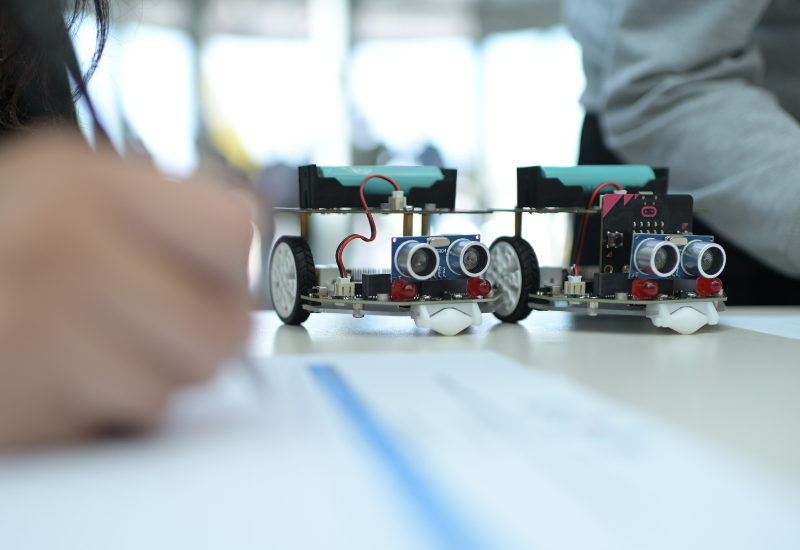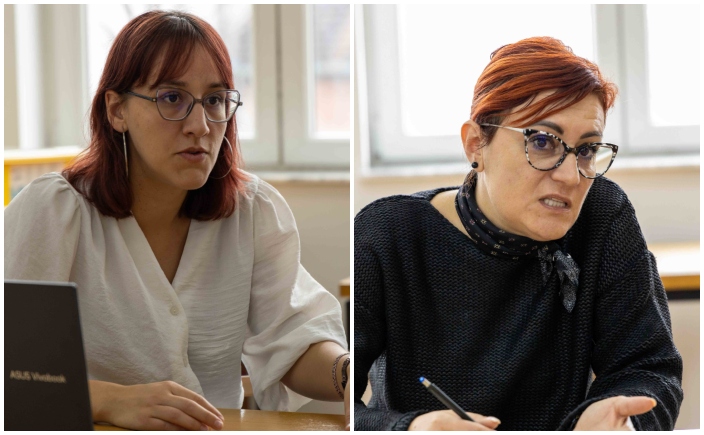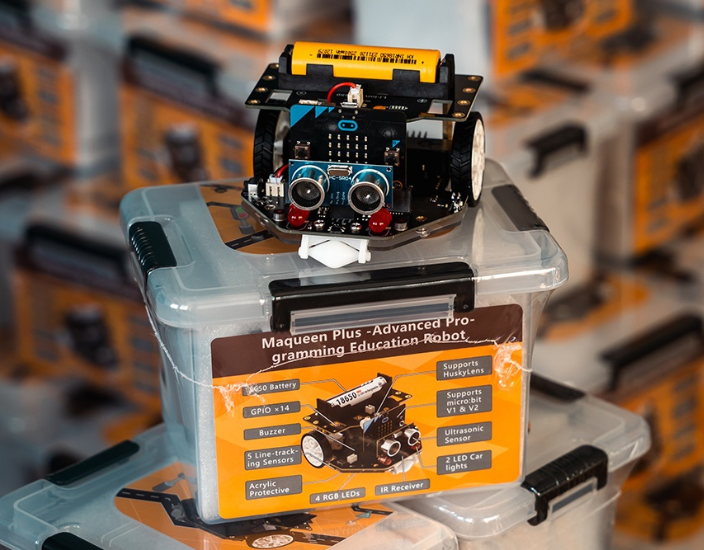In a world where innovation is the key to unlocking the full potential of the next generation, imagine if every child has the knowledge and tools to excel through hands-on learning. This article dives into the story of Kosova Makers League (KML), a non-formal educational platform and its mission to transform education in Kosovo through an innovative initiative. Among its flagship programs is the largest robotics competition in Kosovo, where children aged 6 to 15 from primary schools and other educational institutions participate. Consequently, KML’s central ambition is to provide every child in Kosovo with access to robotics education via the campaign of “One robot per child.”
Building futures, one “bot” at a time – The “One robot per child” campaign
KML wanted to ensure the provision of as many educational robots as possible, to be distributed for free in public primary schools in Kosovo, thereby achieving their digitization. This would enable the inclusion of as many children as possible in a new approach to education, where technology is used to encourage critical and creative thinking, teamwork, and communication skills— critical skills necessary to address the challenges of this country.
Through the “One robot per child” campaign, KML aimed to equip at least 50% of public primary schools in the country, so that as many children aged 6-15 as possible have the opportunity to engage with the world of robotics. Convinced that by fostering an inclusive and nurturing atmosphere within public primary schools nationwide, children of diverse genders, ages, and ethnic backgrounds will have the opportunity to explore freely and get inspired, ultimately shaping them into future leaders in the fields of science and technology.
How did it all happen?
 Flatra Thaqi, Managing Director at Kosova Makers League & Ardita Dushi, Executive Director at “KosovaIdeas”
Flatra Thaqi, Managing Director at Kosova Makers League & Ardita Dushi, Executive Director at “KosovaIdeas”
Photo credit: Arbër Gjoni
KML understood that according to the Ministry of Education statistics in Kosovo, there are 878 public primary schools (both elementary and middle schools) registered for the school year 2021/22. In the past, they had engaged a 212 public schools, so they wanted to reach their goal to secure a robot accessible to all children in primary schools in Kosovo – and to do that, they needed to include another 666 schools and provide them with educational robots (of course for free). By 2024, they intend to distribute 908 robots to support around 227 schools.
To achieve this, KLM started a fundraising campaign in partnership with their sister-organization “KOSOVA ideas”, the first crowdfunding platform committed to projects in all fields of art &culture, civic engagement and sustainability realized in and for Kosovo. It launched online on June 1st, 2023 and ended on July 15th, 2023, a marathon lasting 45 days. They designed the “One robot per child” campaign and together with it an initial plan on how to reach their target to raise 50 thousand euros and engage 227 schools. The plan included persistence and adaptation. Reaching out to tech companies through individualized emails was a first step. Since they did not manage to get the excepted support there, they adapted their plan. They continued with another initiative called “Donate 1 euro”, spreading the message to all the previously participating schools, teachers, parents, etc. This allowed them to encourage donations of just 1 euro, providing other children the same opportunities that the children in their community already have.
The next step was to reach the Municipalities where KML’s “Kosova Makers League OPEN” teams came from and showing them the importance of the educational program, in which they serve, as well as the success that their schools have achieved Kosovo-wide. Some of the Municipalities supported this campaign by giving a total of 41,536 euros to support all their schools. In this regard, they managed to secure a good portion of the support, namely about 65% of the total amount of the campaign collected.
What KML didn't anticipate, but pleasantly discovered, was the spontaneous fundraising initiatives launched by the "Kosova Makers League OPEN" teams. These teams took it upon themselves to individually organize “One robot per child” campaign in their respective communities. For example, student Amar Dobreva, from South Mitrovica organized a fundraising initiative to support the campaign, with the call to create a team from “Down Syndrome Kosova” branch in Mitrovica and promising a donation of funds to a robot from his savings.
Another notable instance of community engagement comes from “Young Innovators” NGO, a participant in the “Robotics Competition” since its inception. They organized workshops for children and parents who have benefited from KML education, raising funds for the campaign. Their goal was to assist other institutions and schools in acquiring robots. Through their efforts, they successfully gathered enough funds for approximately 8 to 10 new schools to join the league.
 “Robotics competition” in Shtime, during which money was collected for the “One robot per child” campaign
“Robotics competition” in Shtime, during which money was collected for the “One robot per child” campaign
Photo source: Official “Facebook” account of “Young Innovators” NGO in Shtime
Importantly, KML’s fundraising efforts encompassed outreach efforts including mass and individualized emails to their network, regular supporters, social media networks and beyond. All the efforts combined during the campaign resulted in a great success.
Turning plans into achievements: A closer look at the campaign success
By the end of the “One robot per child” campaign, KML managed to not only reach but also exceed its 50 thousand euros fundraising target by more than 14 thousand euros. The total funds raised reached the amount of 64,175.00 euros, through the support of 135 sources. Throughout the campaign, KML got support from individuals, organizations, and companies of very diverse sectors, including private individuals, CSOs, foundations, business companies, and public institutions.

Through these funds raised online, KML will now be able to engage in their program an additional 1,000 pupils and 250 mentors through the additional 250 schools, thus having achieved to engage 50% of public schools in Kosovo. They will continue their efforts in the future to fundraise more and involve the remaining 50% of public schools in Kosovo.
Exploring Innovation: A closer look at Kosova Makers League
KML, a spinoff of the BONEVET Prishtina Foundation aims to create an environment of innovation and creativity for primary and secondary school children who are interested in the field of science and technology. The project encourages and develops their cognitive skills, choosing different missions with purpose and technique. It is led by a team of three young professionals and a group of twenty volunteers.
Its most known project is the “Kosova Makers League OPEN” whereby KML organizes an educational program in the format of a competition, where a mentor with a team of four pupils have to apply for the program, get equipped with a robot, and the instructions on how to “teach” the robot to do things according to the pupils’ instructions.
Photo source: Kosovo Makers League
KML then organizes quarterly competitions where all the registered teams are invited to showcase their skills of mastery with the robot. During the competition they get specific instructions on what the robot should be doing, and the youngsters have to directly code, cooperate, find creative and quick solutions in getting the robot to achieve all the set milestones during the competition. Like this, each team earns points depending on well they managed to follow the instructions provided during the competition. Following the end of the year, a number of teams get awarded for their achievements based on the points they have collected throughout the year.
Thus far, they have had 900+ diverse teams join their competitions (with more than 10,000 pupils and 700 community mentors engaged), reaching urban and rural areas, many non-majority ethnic youth and more vulnerable communities like those affected by Down Syndrome. The last physical final of the annual competition “Kosova Makers League OPEN” (2022) was organized in Prishtina Mall.

 Robotics Competition “KML Open 2022/23”
Robotics Competition “KML Open 2022/23”
Photo source: Kosovo Makers League
Kosova Makers League started their “Kosova Makers League OPEN” educational program in 2018. They started with 600 robots and 120 teams, but after the fifth edition of the competition, and its success, they decided that they need to at least double the reach to more municipalities in Kosovo, and more youth to get the chance to learn the logic of programming, strengthen their cooperation skills, explore the STEAM (Science, Technology, Engineering, Arts, and Mathematics) subjects, and provide a space for them to express their talents.
Conclusion
Kosova Makers League and its campaign “One robot per child” is a role model on how action-inspired by the community, for it, with the community's support, can lead to tremendous positive change within the community. The campaign's success was not only a testament to their strategic planning but also highlighted the unwavering support from a diverse array of contributors, including private individuals, CSOs, foundations, businesses, and public institutions.
Ultimately, the Kosova Makers League's "One robot per child" campaign goes beyond promoting and enabling STEAM education. It embodies a community-driven approach, uniting individuals, organizations, and companies from various sectors in a shared vision for empowering the next generation. The success of the campaign not only reached its fundraising goal but also served as a testament to the collective power of diverse stakeholders collaborating to shape a brighter future for Kosovo's youth.
Cover photo source: Kosovo Makers League
This article is made possible by the generous support of the American people through the United States Agency for International Development (USAID). The contents are the responsibility of Catalyst Balkans and do not necessarily reflect the views of USAID or the United States Government.
The Citizen Engagement Activity in Kosovo is a five-year initiative implemented by Kosovar Civil Society Foundation (KCSF) in partnership with the United States Agency for International Development (USAID).





Leave a comment